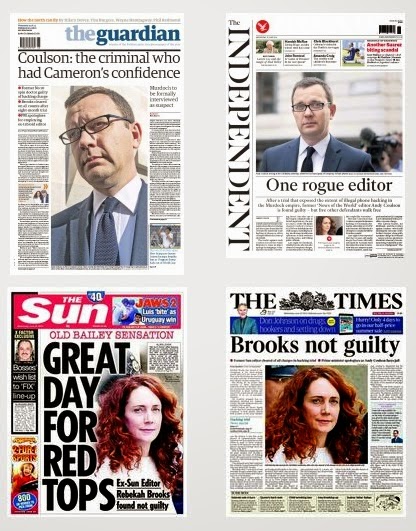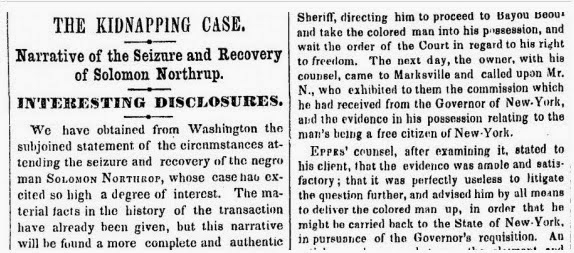Prime Minister David Cameron after Andy Coulson was found guilty of conspiracy to hack phones, as reported by BBC News: "I am extremely sorry I employed him. It was the wrong decision."
Peter Oborne in the Telegraph: "The phone hacking affair has displayed the Prime Minister at his worst – a shallow, amoral, conniving careerist, determined to secure high office at any cost."
The Guardian in a leader: "The vast majority of journalists in this country have never hacked a phone, bribed a public official or used a private detective. Even those who worked on the tiny handful of (albeit influential) papers that regularly trampled on privacy often felt deeply uneasy about it. Numerous individuals within the News of the World newsroom guided Nick Davies's investigations into phone hacking because they felt so uncomfortable about the practices going on around them. So, most journalists feel no regret about the cleansing of the stables, even if they feel conflicted about the prospect of journalists facing jail sentences for crimes committed."
Nick Davies on Coulson and Brooks in the Guardian: "With all the intellectual focus of a masturbatory adolescent, their papers spied in the bedrooms of their targets, dragging out and humiliating anybody who dared to be gay or to have an affair or to engage in any kind of sexual activity beyond that approved by a Victorian missionary."
Rebekah Brooks, on BBC News: "I am innocent of the crimes that I was charged with and I feel vindicated by the unanimous verdicts...When I was arrested, it was in the middle of a maelstrom of controversy, of politics and of comment. Some of that was fair but much of it was not so I am very grateful to the jury for coming to their decision."
Tim Montgomerie @TimMontgomerie on Twitter: "Under @gallaghereditor The Telegraph was strikingly independent of the Tory Party- relentlessly reader-focused. CCHQ will hope that changes."
Matthew Parris in The Times [£]: "Twitter’s a great idea. I absolutely don’t knock the concept of a turbo-charged village pump but it’s not for me. Several times I’ve had to be restrained from tweeting something really stupid; and, worse, if you’re commissioned to write something these days, or perform in a debate, or whatever, the client emails asking you to tweet that you’ll be doing it, or have done it, or re-tweet someone else’s reference to it, or tweet positively about something else somebody has done, and . . . oh dash it all: once marketing people get their claws in, it’s time to get out."
Dan Snow in the Observer: "Anyone who doesn't love Twitter is an idiot. They're being a ridiculous Luddite or taking a stance. Twitter is a way of filtering the news. You tailor your own timeline so who you follow reflects your interests. Mine is populated by politics and history. It's a phenomenal news service, far better for me than any conventional news outlet because I built it myself. I've made new friends on Twitter, interacted with some incredible people, had some of my most satisfying professional experiences and found out lots of fascinating things about the world. It's been a hugely enriching experience."
Robert Peston @Peston on Twitter: "Can barely hear myself think amid din of schadenfreude in UK media at cancellation by CNN of fellow Gooner @piersmorgan's show"
Piers Morgan @piersmorgan on Twitter: "Humbling to bring such happiness to so many people today. Coming 3rd, as I've always said, is not a trophy. #MorganOut #CNN"
Jeremy Clarkson @JeremyClarkson on Twitter: "I understand that Nigerian TV is looking for a new chat show host. Anyone got any suggestions?"
The New York Times: "There have been times when the CNN host Piers Morgan didn’t seem to like America very much — and American audiences have been more than willing to return the favour."
News UK chief Mike Darcey speaking at the Digital Media Strategies conference , as quoted by the Guardian: "Chasing online advertising revenue at scale requires a deep, free online proposition and this in turn undermines the incentive for people to pay for print editions. The Guardian web proposition is so good I wonder why anyone continues to buy the Guardian edition in print at all. They must be very wealthy people."
Guardian Media Group chief excutive Andrew Miller, also at the Digital Media Strategies conference, as quoted by journalism.co.uk: "If we could do a paywall of course we’d do it. We’d love to, but that horse has bolted."
Culture Secretary Sajid Javid in The Times [£]: “In terms of the role of this department . . . the work has been done, and it is now a decision for the press what they want to do next. I don’t see any further role for government in this. Notwithstanding the fact that any industry has its bad apples, I think our press is the best in the world. It is fearless without favour.”
Ex-Sun editor David Yelland@davidyelland on Twitter: "Quiet surrender on a Saturday: Govt has 'no further role' in regulating the press, says new culture sec Sajid Javid."
 |
| Some believe this is the work of Banksy on a wall in Battersea |
The New York Times runs a correction 161 years after it ran the story that inspired the Oscar-winning film '12 Years A Slave': "An article on Jan. 20, 1853, recounting the story of Solomon Northup, whose memoir “12 Years a Slave” became a movie 160 years later that won the best picture Oscar at the 86th Academy Awards on Sunday night, misspelled his surname as Northrop. And the headline misspelled it as Northrup. The errors came to light on Monday after a Twitter user pointed out the article in The Times archives.”
Graham Lovelace @glovelace on Twitter: "Why, when major world developments threaten peace and stability, is David Moyes leading the news agenda?" #itsonlyfootball
SubScribe blog: "There will be many who look at the papers and wonder at the amount of effort being put into this story in comparison, say, to the Korean ferry disaster. This is not only football, but also very big business, so who manages Manchester United does matter. But there are far, far more people who don't care about United than do. This was demonstrated on Twitter with tweets showing people how to cut anything to do with Moyes from their streams."
Janice Turner on the coverage of the death of Peaches Geldof, in The Times [£]: "The dilemma now is how we deal with death in a digital age. The press faces constant accusations of tastelessness or intrusion. But it was the US president and British prime minister who posed for a selfie at Nelson Mandela’s memorial; Diane Abbott MP who live-tweeted Tony Benn’s funeral. The more a famous person shares of his or her life, the closer the public feels entitled to be. The last of countless Twitter photographs Peaches shared was a childhood snap with her late mother, yet newspapers who republished it were condemned."
Giles Coren in The Times [£] on the claims that people no longer read books because they are too busy skimming social media: "This is worst among journalists, who are without question the least well-read people you will ever meet (unless you regularly meet chefs). They spend all day 'reading' newspapers, shorthand notes, filed copy, newswires, blogs, and when they come home they reckon they’ve done their 'reading' for the day and now it’s time to drink cheap wine and watch Game of Thrones."
Publisher Felix Dennis, who died in June, interviewed in the Observer in 2013: "It's not quite right, is it? To shag all the women, have all the money and two cases of Petrus in my wine cellar and then write poetry that sells and that people love. It shouldn't be allowed. That's what annoys people. They think that I've got to get what's coming to me and no doubt I will."
[£]=paywall



















































